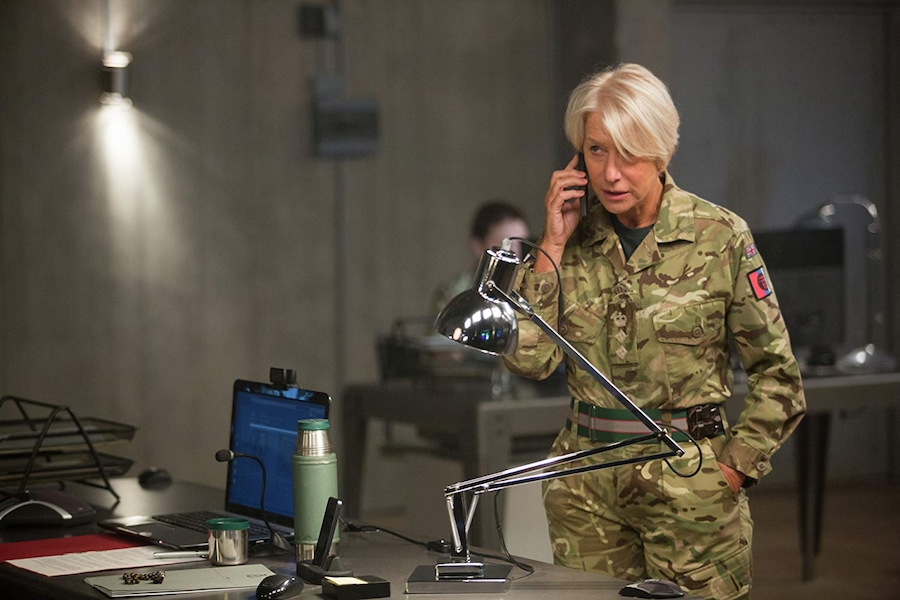
‘Eye in the Sky’: A Review
South African director Gavin Hood’s Eye in the Sky is a film about the current nature of warfare –and its changing configurations from the traditional “boots on the ground” attack familiar to moviegoers of only a few short years ago to a devastating remote air strike carried out by pilots in Nevada thousands of miles away from their African target. The target itself is identified as legitimate through visuals and its eligibility and potential downsides assessed via a complex series of international “rules of engagement.” Those rules, we learn, have as much to do with assessed propaganda value as they do with military necessity.
The film opens with the image of Aisha, a charming engaging little Nairobi girl within her family compound gyrating happily, playing with her father’s homemade hula hoop. An irate friend of her father’s chides them both, given that in a country where modesty demands that even the wrists of women must be covered, hula-hooping may not be correct behavior for a young lady. (Although her father defends her to his friend, pointing out she is still just a child, he later sternly bids her play with the hoop only in private.)
Images of this innocent little girl and her hula hoop reappear throughout the movie, ever more ominously, images projected by tiny drone mechanical bees and birds “eyes in the sky,” onto the multiple laptop screens of grim faced military and political bureaucrats in the UK, the strike base in Nevada, and on a tiny cell phone in Africa. These tiny devices can fly under the radar, penetrating even into private homes to find out the hiding places of the inhabitants. Initially fascinating to watch, they become increasingly sinister as we realize that they will lead the watchers – onscreen and off – to human targets.
We watch the politicians and soldiers in the UK and the US, readying themselves – not simply to strike, but to make the decision to strike.
This excruciating process is called “referring up” – each man or woman in a panic over accountability feels it necessary to pass the decision buck up the chain of command, even to the PM, or failing that, over to their American allies. Who themselves give mixed responses but essentially can’t understand why the Brits are dithering so.
A UK foreign secretary is seen far more preoccupied by his gastric distresses than by this top priority decision, and his colleague, the US secretary of state, is obsessed by his need to win in a Beijing demonstration ping pong tournament rather than to advise his allies.
To be fair, it is not a simple matter to take out a radicalized converted UK citizen, a woman terrorist, and her close associates at the top of the list of Britain’s Most Wanted – The mission, originally to capture the target rather than to kill, has quickly changed when watchers realize that they are also witnessing within the same compound the arming and dispatching to the world outside of several suicide bombers.
The bombers present a clear and imminent danger to the populace. And this in turn involves what the supposed decision maker eventually call a decision on “winning the propaganda war.” The reported death at British and American hands of a single innocent telegenic African child in a friendly country with which neither Britain or the US are at presently at war, may or may not outweigh the death of many thousands of innocent noncombatant adults and children.
We are repeatedly reminded that this upcoming strike will target this child and all her neighbors– they will be “collateral damage” at an estimated figure of 45% probability. An acceptable level of slaughter, not to put too fine a point on it. And one which is roughly manipulated into being by the tough, non-nonsense Colonel played by Helen Mirren, who clearly recognizes that without a figure of below 50% estimated collateral damage offered to the theoretical decision makers, the frantic dithering ministers will never arrive at a decision to strike.
The British and US ministers and military personnel portrayed here are not monsters. Indeed, the Lieutenant General, the central figure within the British government, played by the incomparable Alan Rickman as Lt. General Frank Benson, enters talking to his family on his cell phone, lamenting that he’s bought the wrong doll for his daughter. We might compare him to the fond father of the Nairobi child, who constructed the hula hoop for his daughter.
Nor are the soldiers themselves monsters – the tortured UK soldier who is responsible for launching and monitoring the spyware drone birds and bees, and the Americans pilots directly responsible for executing the remote strike Operation Hellfire. The drone master tries desperately and fruitlessly to get the little girl out of harm’s way even as he moves to position the drones within the strike zone.
Similarly, the ranking American pilot, frightened and horrified by the new orders to kill, directly challenges Mirren’s Colonel’s orders, asserting his right to order a recheck of the collateral damage probabilities. Once the recheck is carried out and the risk assessment recreated at a percentage low enough to meet the rules of engagement, the pilots are ordered to strike. They weep as we watch the devastation of the airstrike and the inevitable death of little Aisha- of her friends, the entire town center.
I was reminded of Zero Dark Thirty, also a film which records what becomes justifiable in war, what happens when violence becomes a way of daily life on both sides. And when the language of violence becomes increasingly depersonalized, making it easier to carry out unspeakable acts. In Zero Dark Thirty the language debased is the phrase “enhanced interrogation” or waterboarding, a brutal form of torture. In Eye in the Sky the death of a little girl and an entire town in a theoretically friendly nation becomes “acceptable collateral damage.”
Although there were only a few people in the theatre when I watched this movie, a muted snuffling around the perimeter suggested that we were all near tears. We left the theatre in silence.

